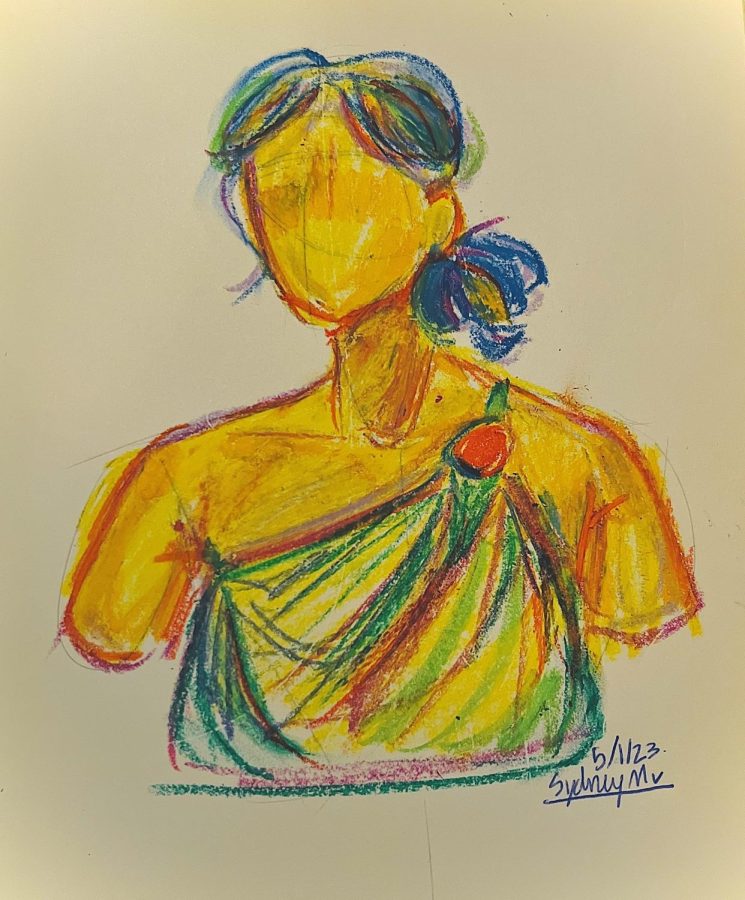Opinionated Gal Pals: The Greek Gods
May 2, 2023
The ancient Greeks: a great civilization whose advances forever changed humanity. They produced incredible mathematicians and philosophers whose ideas we still use today. They gave us democracy and were one of the most significant historical empires to ever exist. An interesting facet of their ways was their unique religion which paralleled the Romans. Greeks were polytheistic, meaning they believed in more than one god.
An essential part of many mythological stories is nymphs, divine female entities associated with growth and nature, often in water and trees. They caused many problems with men and were known for playful affection.
There were almost too many to count, from Zues to Dionysos. They all worked together to make the world work, and the Greeks didn’t let them go unnoticed. Every god had an epic that chronicled how they came to be, even the nymphs and demigods were part of the legendary myths.
Nike, no not the brand, even if it was named after her, the goddess of victory. She and her sisters, Bia (force), Cratos (supremacy), and Zelus (rivalry) were often seen beside Zeus. They were incredibly powerful. Her parents are Styx (mom) and Pallas (dad). Not much is known about her or her life.
One of the lesser-known but a member of the 12 mighty gods is Donysus. (In Roman mythology Bacchus) Dionysus was the god of fruitfulness and vegetation; or the god of wine and pleasure. His tale was a tragic one of misfortune at the hands of his father’s wife. (After Zeus, his dad, had an affair with a mortal woman, Smele). When he was an infant that went by the name Zagreus, Hera had him torn to pieces, cooked, and eaten by the evil titans- or the 12 original gods of Olympus. A goddess named Athena found his heart and saved it. After Athena brought the heart to be resurrected by Zeus, he got renamed the god we know now, Dionysus.
Another fan favorite is Poseidon (or Neptune if you’re a Roman), the god of the seas, horses, storms, and earthquakes. His father is Cronus (a Titan), and his mother is Rhea. He also happens to be brothers with Hades and Zues. Poseidon is known for his big three-pronged trident that he’s never seen without. Poseidon is one of the more angry gods out of the bunch, known for his war-like temperament. He also reportedly had a male lover, Nerites, who was a minor sea god. Poseidon has a special love for mortals and a lot of kids.
Next up is the Underworld’s favorite couple, Persephone and Hades. Hades (Pluto) is the god of the underworld and one of the most powerful gods. He’s married to the much younger goddess of spring, Persephone. She’s the daughter of Demeter and Zeus. Their story, according to myths, goes as such; Once while Persephone was away from home, like she often was, after fighting with her mother, she stumbled her way to a field where Hades observed her picking flowers. Instantly infatuated with her beauty, he brought a chariot and carried her away to live with him forever. Persephone’s doting mother, Demeter, was horrified at her presumed loss. Her sadness wreaked havoc on the people of Greece. The eternal growing season changed with her mood as Persophne came and went. Grief overtook and became Winter, summers of happiness and spring filled with love, fall always dying as the rollercoaster Persephone put her mother on went round and round. Persephone eventually grew to love her place as the Underworld’s queen.
Hestia, goddess of the hearth, home, and hospitality. She was the eldest child of Cronus and Rhea. Much like Athena, she remained celibate throughout her life. She’s known for renouncing her position as one of the big 12, and she preferred regular humans and their warmth over godly affairs and stupid entertainment.
Hera, or Juno, was just one of the wives that Zeus/Jupiter had. She was his main wife, making them the king and queen of the gods of Olympus. Although the reason they got married was shameful, Hera soon fell for the mighty king of Olympus. The relationship between them is rocky. Zeus often cheats on Hera, which doesn’t go over well considering she’s the goddess of women, marriage, childbirth, and family. Their personalities are very contrasting, Zeus the king of lightning and thunder, was often level-headed, but just like the weather, he could change with a slight shift in the wind. Hera, upset with the lack of stability and how non-family orientated Zeus is, was quite often mad at him. They couldn’t ever make things work even though they stayed together for their entirety.
Demeter, goddess of harvest and mother of Avion and Persephone. She’s why we have the seasons according to legend. After the rape and abduction of her favorite daughter, she was so distraught searching, that agriculture was forever changed. She was sought after but chose to stay away from her pursuers. Demeter and her daughter were very close and often thought of as one.
The goddess of love and beauty, Aphrodite/Venus, was known for her love of mortals and affairs, just like her parents, Zeus and Dione. Her birth story is an interesting one and slightly complicated. Aphrodite had many forms, often appearing as the beauty to the eye of the beholder. She was the source of many wars, worshiped and fought over for her appearance, people couldn’t contain themselves. She caused trouble among all the gods, especially when it came to embarrassment about affairs.
The goddess of wisdom, warfare, and handicraft, Athena. The goddess, known for her strength and smarts, was an incredible representation of women and forever a life-long celibate. She stood strong and proud for what she believed in, as she should have. She challenged anyone who dared to defy her. Her symbols were an owl and olive trees. The olive branch symbol comes from it representing her stake in Athens when she fought against Poseidon and will always show her dedication and mark on things as such.
Apollo the god of the Sun and creativity, and Artemis, his sister, goddess of the hunt and Moon. Apollo rides on a golden chariot to bring the sunrise each morning and to set it each night. Known for his good looks and clear-headedness he often got in trouble with his father, Zeus, for his part in wars. His sister, Artemis, like Athena and Hestia, vowed to never marry. She’s regarded for her wild spirit and love of spending her time doing things such as dancing with wood nymphs.
Pan, the god of the wild, shepherds, meadows, and mountains, is an often overlooked god. He’s half goat/half human and depicted as short, stubby, and hairy. He’s often seen with Dinoysus. He assisted the main gods in many battles, especially when he needed to fight against Typhoeus. He’s also known for his magical pan flute, hence where their name comes from.
Ares (Mars in Roman culture) was the god of war and courage and was a part of the main 12 Olympians. His mother and father were Zeus and Hera, and his half-sister was Athena. In many of his experiences, he was humiliated. When he was having an affair with Aphrodite, he convinced him to join the side of the Trojans; who would later lose to the Greeks being led by none other than his sister, Athena. Along with that, while committing adultery, his lover’s husband found them and humiliated them both in front of the other gods after setting up a trap in the married couple’s bed. Ares had a tragic life, even when he was younger, always being one of the more hated gods. No matter how loyal his followers are. (He was worshiped by many people, having sacrifices made to him. In particular, war prisoners would be killed in an attempt to please the god of war).
Hephastos (Vulcan) was the god of fire, crafts, and metallurgy. His workshop was beneath a volcano, where he would craft swords and manipulate fire. His mother was Hera, and he was thought to have no father. When he was younger, he was thrown from the Heavens by his mother Hera for being so repulsively ugly, a terrible fate for any child, doomed to grow up with issues. He landed in Lemnos where he was found crippled. For a short period of time, he was married to Aphrodite, who would later cheat on him with another god, Ares. With his skills, he would make things for others, and himself. Creating, what were servants, from gold who worked and were as intelligent as him. His work would later be of use to others when the time was needed. For such a terrible life, he was incredibly talented, useful, and underappreciated.
Hermes, the gods’ messenger, was known for being mischievous. He was depicted with his infamous winged sandals and double snake staff. Hercules, a mortal, who we felt needed to be briefly mentioned. He rode around on the winged horse, Arion. He was known for his incredible strength and for killing many feared monsters. Like Perseus, who slayed Medusa.
We interviewed our friend Vanesa Aguirre for her thoughts on greek mythology to possibly bring some insight to this topic. Addison asked her what she enjoyed the most about Greek mythology. Her response was the following, “What I like about Greek mythology is that it is truthful and straightforward, very realistic, especially in its characters. I love how it can portray the protagonist, the main hero, as not only flawed, but just outright a terrible person sometimes. Similarly, the gods in Greek mythology are set as higher beings, but unlike other religious deities, they are not perfect and totally divine.However, they are the opposite, very human in a sense that they are not holy and are actually pretty horrible people and quite literally narcissists. Greek mythology is very easy to follow, the easiest mythology to learn about, in my opinion, and super interesting and intriguing.” We personally agree with her, Greek mythology is very fascinating and we hope that the many tales never die and spin offs like Percy Jackson stay on the rise.
To bring this article to a close, we’d like to say that Greek mythology is incredibly interesting and important to know to understand that time period. The epic tales, triumphs, and downfalls make for interesting stories. If you’d like to continue researching, some useful resources would be: <ahref=”https://www.greekmythology.com/Other_Gods/Demeter/demeter.html”>Demeter: GreekMythology.com</a> – Feb 15, 2023, as well as https://www.worldhistory.org/



